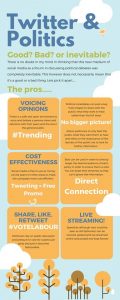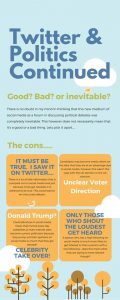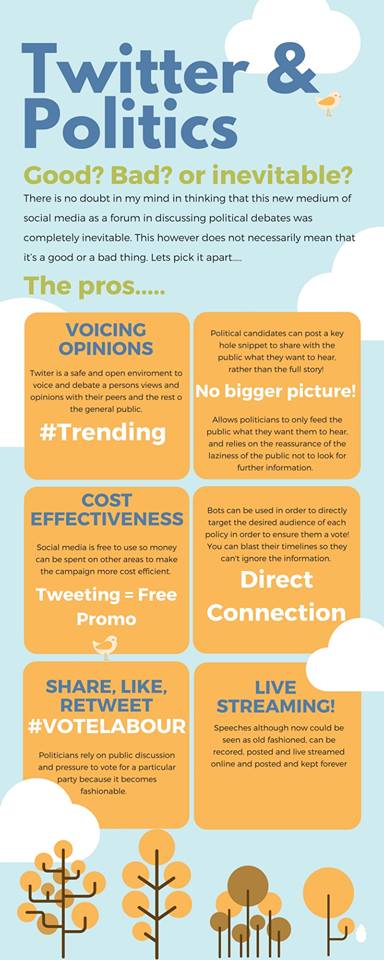body {


There is no doubt in my mind in thinking that this new medium of social media as a forum in discussing political debates was completely inevitable. This however does not necessarily mean that it’s a good or a bad thing. Lets pick it apart…..
h1 {
colour: green;
}
Pros:
The pros of this new medium being used as a platform for young people and even old people to voice their opinions in a safe open environment, allowing them to discuss, share and debate their own views in relation to the rest of the publics. As well was this the main positive of the new medium, which I have spoken about in my previous posts is that it allows the political candidates and leaders to get exactly a key hole snippet into exactly enough to allow the public to know what they want them to think they are voting for, rather than the actual accurate bigger picture of it. Another pro is that because social media is free to use they will save a lot of money of aspects of their campaign that previously would have cost them a lot of money, for example the costs of hiring a venue to do a speech and paying for promotions, advertisement and reporters to show up can all be cut down just be doing a quick ten minuet live stream. By posting it on social media it will inevitably get shared more times and most likely viewed by more people that the expensive speech would have reached out to.
Cons:
One of the main cons of the new medium taking over is that because social media is such an open playing ground it means that there is no filtering system in order to check that the information pumped out by non professional accounts is accurate. This means that the public may be reading heavy amounts of fake and inaccurate information, which inevitable will sway their opinion, and judgment, which might result in them making a vote, based on completely the wrong information. If a large percentage of the people vote on this understanding it could mean that the outcome of the vote wont be a good reflection of what the public might actually want.
However taking into account the pros and cons, no matter how strong these points are, with all the advances in technology it was only inevitable that the political discussion was only going to head this way. What I find most interesting about this however is most politicians are quite old so they wouldn’t have grown up in the age of social media and the age of technology, so although they are quite late and deep into their career they will have to completely change and adapt their own political campaigning in order to stay relevant and popular. This is something that the Labour party and Jeremy Corbyn did very well which can be seen in the sheer majority of positive tweets about him and hashtags that circulated.
Another interesting point that I would like to draw upon is that with the advances in technology allowing different people to be so interconnected in one database on the same level as each other, it could mean that soon is there could be the possibility that average social media celebrities who voice there options’ could be in danger of getting elected rather than seasoned politicians. Then again this has already happened…..Donald Trump?
}
